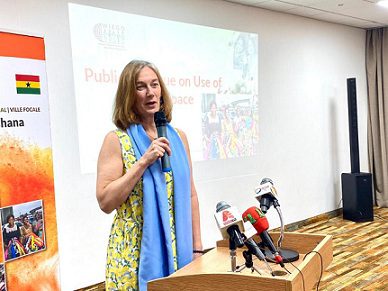Women in Informal Employment: Globalizing and Organizing (WIEGO) Focal Cities Project, in collaboration with its partners and informal workers’ organizations, has organized a public dialogue to deliberate on the use of public spaces by informal workers in Accra.
The public dialogue aimed to provide a forum for key stakeholders in Accra to discuss the potential and challenges of informal workers using public spaces for economic activities within the context of the existing regulatory framework, the need to include informal workers in economic recovery, and global best practices.
In Ghana, women make up the majority of Accra’s informal workers, who account for over 80 percent of the city’s working population, according to the government.
However, as part of measures to help sanitize the city, the Metropolitan Assembly (AMA) launched a new “decongestion exercise” to clear traders off streets and pavements downtown.
The government is convinced that eviction will create an environment in which people will be able to move around more freely, as opposed to the current situation in which they compete with vehicles on the roads.
Dr. Sally Roever, the International Coordinator for WIEGO, speaking at the forum stated that evictions are ineffective since they destroy jobs and make life unbearable for the masses.
According to her, the government must take a comprehensive approach by engaging in social dialogue with the masses. Evictions necessitate both financial and human resources.

Accra Focal Cities Coordinator for Women in Informal Employment: Globalizing and Organizing (WIEGO) Dorcas Ansah, also underscored the need for the government to invest in the understanding of the informal Economy since it has contributed immensely to Ghana’s economic growth.
The President of Greater Accra Markets Association Mercy Naa Afrowa Needjan, also bemoaned at the manner in which authorities destroy the goods of the mark folks in the name of decongesting the city.
“We believe that the cities will be clean as we desire if the government can have a social dialogue with them and put strategic measures in place rather than destroying their goods and abusing them.”
She also implored those who have space at marketplaces to avoid trading on the pavements to avoid being harassed by authorities.
The social dialogue was organized by Women in Informal Employment: Globalizing and Organizing (WIEGO) Focal Cities Project, alongside its partners and informal workers’ organizations – Greater Accra Markets Association (GAMA), Informal Hawkers and Vendors Association of Ghana (IHVAG), and Kayayei Youth Association.

Source: Isaac Kofi Dzokpo/newsghana.com.gh









![Mr Logic signs two dancehall artistes unto his Red Panther record label [Video]](https://ghananewss.com/storage/2023/05/Mr-Logic-signs--100x75.jpeg)




